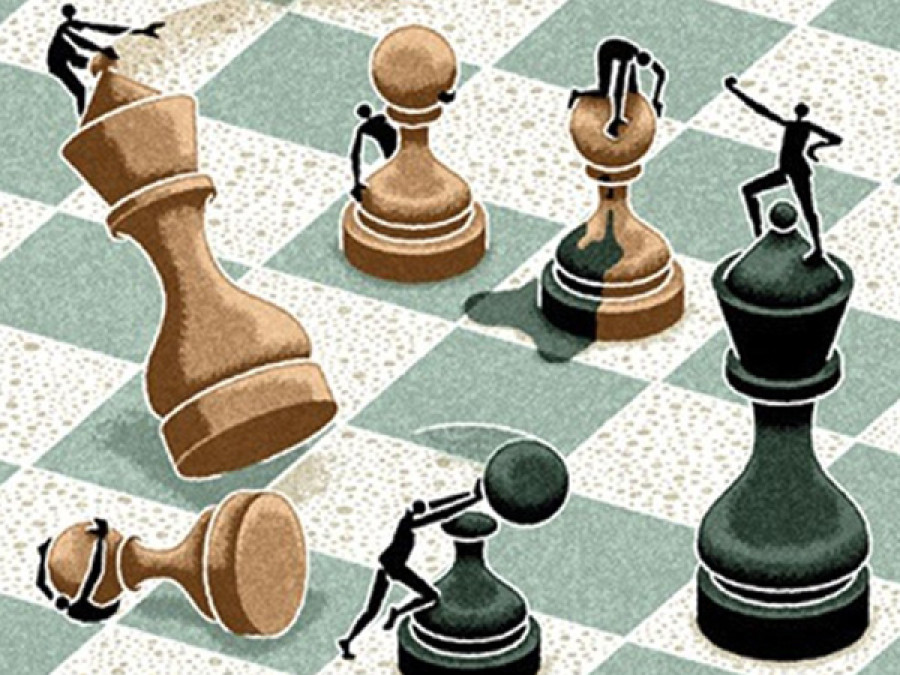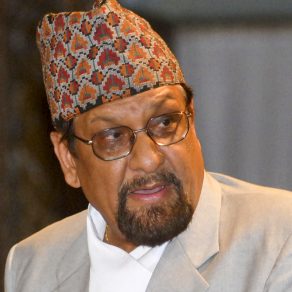Opinion
Politically possessed
Political instability and excessive politicisation are taking a toll on Nepal’s development
Ram Sharan Mahat
The national convention of the Nepali Congress (NC), a conventional democratic practice for any political party, was concluded recently. The convention, among others, elected the new president and other functionaries of the party. The event was one of the largest political congregations ever witnessed in the Capital, immediately preceded by a series of party conventions at local levels, from VDCs, municipalities including wards, electoral constituencies to districts throughout the country. The whole exercise took about two months, which placed more than 50,000 members in various party positions. This exercise was followed closely by the election for the parliamentary party leader and members.
It was undoubtedly a massive democratic exercise of a political party which received accolades and compliments from various sections. Such internal electoral exercise of this scale is often unheard of with respect to political parties in other countries in similar conditions.
The Constitution of Nepal 2015 has a special provision to regulate the formation, organisation, accountability and transparency of the political parties. It makes it mandatory for all party office bearers to be selected periodically through electoral process, but does not specify the nature and scale of the electoral process. Non-fulfillment of this condition may lead to nullification of a party for elections as no act specifies the procedure in such situations. The Election Commission of Nepal is currently drafting the Integrated Party Law which will hopefully provide the procedure to be adopted in such cases. Every political party in Nepal has to follow the electoral process in internal party election, although the degree of participation and transparency may differ. The CPN-UML also conducts its convention on a similar scale.
While the merits of an internal democratic exercise with as large participation as possible are beyond question, the costs involved in terms of time, energy and resources are massive. The politicisation and the rivalry between and among groups and sub-groups are too obvious to be missed. However, in various places the intensity of the campaign, pouring of sentiments and resources, publicity blitz, among others, witnessed in the NC’s convention evoked criticism from various quarters. Various NC district chairmen minced no words in decrying the extravagant publicity campaign contrary to the party’s socialist commitment.
The party election does not end here. Elections are held for party sister organisations—youths, students, labour groups, teachers, ethnic bodies, women, press, and various other segments—as well. Even in other non-party professional bodies like the Nepal Bar Association, the FNCCI district chapters, federation of journalists, universities, etc., elections are fought on party lines, with the political parties themselves announcing the candidates in many cases. Party politics has deeply penetrated into educational institutions, and in the management of local level projects and institutions. Trade union and student union elections are also bitterly fought on party lines. Even for school management committees, forest and water users and other committees, elections are fought on party lines as a standard practice. Thus, Nepal presents a unique case of democracy, perhaps without parallel, where elections are practically pervasive in all walks of life. This is not to deny the importance of choosing institutional leadership based on free will of its members, but one can hardly expect impartial delivery of services from professional institutions with partisan leadership.
Blatant party politics
In a democracy, constitutional bodies are conceived as watchdogs and independent judiciary is responsible for ultimate dispensation of justice as a deterrent against misuse of executive power. But even these bodies are not perceived to be immune from political influence, given the space allowed for the major parties in the selection of constitutional body members and judges of the Supreme Court. Appointments for universities, national centres of excellence in medical and other fields and public corporations are guided by political considerations rather than merit. Even more blatant and conspicuous party politics exists in the civil service and public enterprises, where one sees multiple trade unions organised on party lines. Such bodies are not limited to their normal trade union functions, as their interventions in management, including personnel appointments and transfers, are common. As a result, major civil service decisions including transfer, promotion and placement of officials are not based on merit and norms. Bureaucratic decision-makers find themselves helpless against such practices in the face of political protection enjoyed by pressure groups.
Politicisation also occurs when there is change of government. And Nepali politics has been notoriously unstable. Since the start of the peace process, we have seen eight cabinets in nine years. With a cabinet change, there is a reshuffle of top civil servants, including secretaries, as well as departmental, office and project heads. It is difficult to see the same office head for more than a year. Some ministries have seen a transfer of civil servant leadership three to four times a year.
The present government has gone extra miles in politicising civil service and development administration. It has not only created six deputy prime ministers and bifurcated ministries, but made a mockery of administrative discipline by indulging in blatant politicisation of professional bodies and a civil service reshuffle. Even the judiciary is not left untouched. Its casual, lackluster and partisan approach even in a serious matter like reconstruction is visible from its failure to form a credible and effective National Reconstruction Authority even after six months of coming to power.
Deleterious effects
Politicisation in professional and educational bodies, civil service, appointment of ambassadors and now even judiciary weakens governance and creates deleterious effect on economic development, more so in a country like Nepal where a change of government is frequent, constitutional institutions weak and bureaucracy helpless. Corruption and other malaise are a natural outcome of this situation. Apart from being the root cause of all corruption, expensive elections and excessive politics in all walks of life leave little room for objective and impartial judgment. Such state of affairs creates a disincentive for the best and the brightest to join and stay in government.
Politics is as much a variable for development as is economics. Ultimately, economic institutions function within the framework of the political setting. Political institution does not only mean what is written in legal documents and the constitution, but also the state’s capacity to regulate and govern society. Political instability, erosion of institutional authority and excessive politicisation are all taking a toll on Nepal’s development.
Economy first
There is no alternative to democratic and inclusive institutions working under a definite set of norms. They must be able to foster right economic institutions to incentivise people to work hard, save and invest, produce and compete, innovate and adopt new technologies, free from hindrances. This paves the way for greater opportunities and prosperity.
The economy must be the first national priority, and not just in rhetoric. Development institutions and professional bodies must be known for excellence and professionalism. Civil service and judiciary must remain apolitical. Quality and excellence, not political affiliation, should decide the choice of public sector managers. There is an apparent need to revisit prevailing practices to make our elections less expensive by regulating political finance not just during elections but at all times. The country needs an environment where citizens spend more time, energy and money in economic activities which contribute to development, peace and prosperity.
Mahat is former Finance Minister and Nepali Congress leader




 24.71°C Kathmandu
24.71°C Kathmandu











